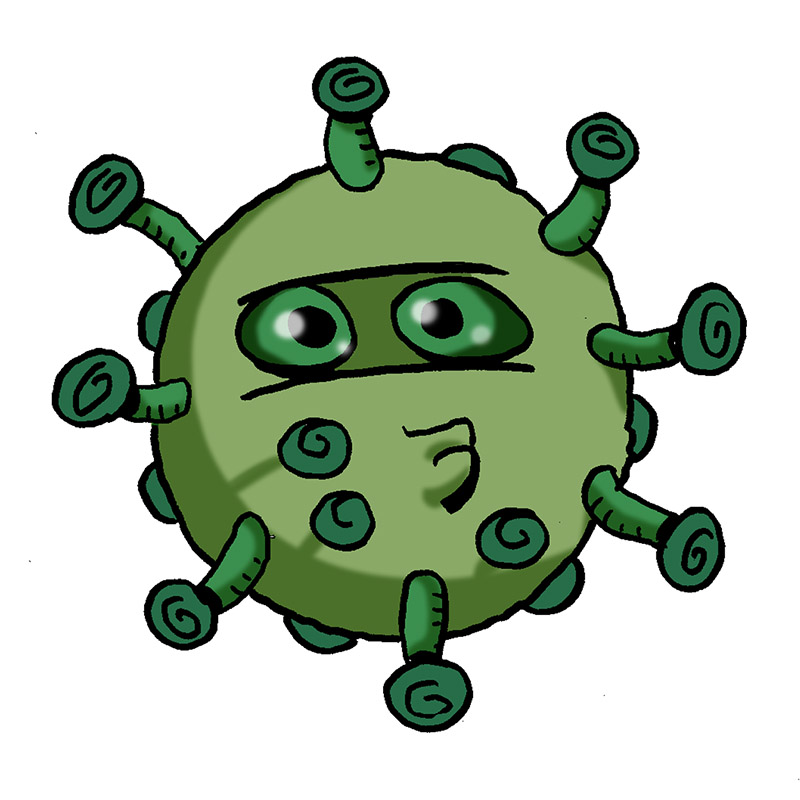STIs
Hey! While talking about bodies on this page, we use medical terms like ‘penis’, ‘vagina/front hole’ and ‘anus’ to describe our bits. This is just so you know what we're talking about, as our communities often use similar words for quite different body parts - particularly our genitals.
When talking about yourself, or being referred to by others, we encourage you to use and request the language you feel most comfortable with instead! For more information about affirming language for our bodies and bits, click here.
Sexually transmitted infections, or STIs, are infections that can be passed from one person to another through sexual contact.
While staying safe, testing, and treatment is slightly different for every STI, there are lots of simple ways you can keep you and your sexual partners safe. There are also effective treatment options for most common STIs in Australia.
One of the best tools for staying safe is knowledge and regular testing, so you can make informed choices about the kinds of sex you want to be having, who you want to have it with, and ways to stay safe while doing so.
This page was developed in collaboration with the Albion Centre’s T150. We also worked with the ACON teams responsible for Ending HIV and peer education programs.
Staying safe
It can feel a bit daunting having to think about how to prevent the transmission of so many different STIs, but there are a few easy things you can do to greatly reduce the chance of transmission.
Using barriers and lube, and regularly testing for STIs and Blood Borne Viruses (BBVs) are great ways to stay safe, and you can read more about them at our sexual health page.
Talking with partners about testing and sexual practices
Another way to look after our sexual health is to talk about it with sexual partners.
This may include talking about your STI and HIV status and asking about theirs, sharing when you last tested for STIs, what types of sex and sex acts you are interested in, and what are off the table, and what barriers and supplies you have available.
It’s important to remember that regular STI testing should be celebrated and also doesn’t say anything about your sexual history, the reason you’re telling your partner is so they don’t have to make any assumptions. Testing often = knowing your status, and knowing your status means being able to talk about it.
What are some of the more common STIs?
While it’s good to know some basic information about each of these, it’s also important not to be scared of STIs. All of the below STIs can be tested for as part of a regular STI screening at a GP or sexual health clinic, which is a great way to look after your peace of mind.
By testing regularly, knowing your status, getting treated early, and seeing an affirming sexual health nurse or doctor if you think you have any symptoms, you can easily and comfortably manage your sexual health.
Chlamydia
Chlamydia is a bacterial infection that can be passed on through sexual contact, including oral sex. It can be transmitted to another person even if you don’t have any symptoms. Chlamydia is treated with a single course of antibiotics (2 tablets). Chlamydia is identified through a urine sample.
It can also be tested for with swabs - vaginal/frontal, anal and throat.
Gonorrhea
Gonorrhea is a bacterial infection that is transmitted through sexual contact, including oral sex and kissing (). It can be passed on to another person even if you don’t have any symptoms. Gonorrhoea is treated with a single course of antibiotics (2 tablets and an injection). Gonorrhea is identified through a urine sample.
It can also be tested for with swabs - vaginal/frontal, anal and throat.
Syphilis
Syphilis is a bacterial infection that can be passed on through sexual contact, including skin to skin contact. Syphilis is treated with either penicillin injections or tablets.
Syphilis can be tested for with a blood test.
Hepatitis B
Hep B is is a virus that causes inflammation of the liver. Hep B is the most common Hepatitis and can be passed on through sexual contact, by using non-sterile equipment when injecting drugs, getting piercings and tattoos not done by a professional (ie. stick and pokes), or sharing items like razors or sex toys that may have blood or body fluids on them. Most adults who get hep B will clear the infection without treatment.
Hep B is identified with a blood test. There is also a safe and effective vaccine available that prevents hep B.
Hepatitis C
Although not traditionally considered sexually transmissable, Hep C is a virus that causes liver inflammation and is passed on when infected blood enters the bloodstream of a person who does not have it, including using non-sterile equipment when injecting drugs, piercings and tattoos not done by a professional (ie. stick and pokes), or sharing items like razors or sex toys that may have blood on them. New treatments called ‘direct acting antivirals (DAAs) are available, and they are highly effective with 90% of people clearing the virus. Hep C can live outside the body for a very long time, and can be transmitted sexually, although this isn’t particularly common and is usually associated with heavy play such as long fisting sessions.
Hep C is identified with a blood test.
HIV - Human Immunodeficiency Virus
HIV is a virus that weakens the body’s immune system, which over time can lead to other life-threatening infections, collectively known as AIDS. HIV can be passed on in a number of ways, including unprotected anal sex or vaginal/frontal sex, sharing of drug injecting equipment, and via breast milk. HIV is not passed on through contact like kissing, shaking hands, sharing utensils and glasses, or through toilet seats. HIV transmission can be prevented with PrEP, PEP, using condoms or by having an undetectable viral load (U=U). For more information about prevention (including PrEP and PEP), testing positive, and ending stigma, see our page all about HIV.
HIV is identified with a blood test or a HIV rapid test.
HPV - Human Papilloma Virus
HPV is a virus that often causes no symptoms and clears up on its own, but can sometimes cause serious illnesses. For more information, see our page about cervical screening.
HPV is the cause of most genital, anal and throat cancers.
HSV - Herpes Simplex Virus
HSV is an infection that is transmitted through skin-to-skin contact. There are two different but closely-related viruses:
- Herpes Simplex Virus Type 1 (HSV-1): Commonly known as cold sores, HSV-1 usually presents around the mouth, genitals, or anus. Symptoms can start with 'tingling' or itching, followed by sores or blisters
- Herpes Simplex Virus Type 2 (HSV-2): Commonly known as genital herpes, HSV-2 usually presents around the genitals or anus. Symptoms can be sores or blisters.
There is no cure for herpes, however there are treatments that will reduce symptoms and help speed up recovery.
Having an STI
This section is about testing positive for STIs other than HIV. For more on that subject, go to our page all about HIV.
Sometimes the outcome of doing an STI test will be finding out that you’ve got a positive result. Finding that out can feel a bit isolating or alarming. Whether you had a persistent symptom and felt like something was a bit funky, or were just doing your regular testing and are completely surprised by the result, it’s much better to know because now you can do something about it.
Being contacted
If you’ve tested at a sexual health clinic or doctor’s office, you will be notified if any of your results come back positive. This will usually also include a follow up appointment for treatment, or directing you to a service that will treat you. The faster you start treatment, the better, which is why they will often try to get you in as soon as possible.
Treatment
Treatment will look different depending on the STI you have, and other factors such as allergies, illness, or other medications. When talking to a doctor about treatment, they will likely take or check your medical history and any known allergies or reactions to medications. They will also give you a recommended time period to abstain from sex while the treatment is working.
Talking to partners and contact tracing
Telling someone they might have an STI is important. It helps our sexual partners look after their own health, and also means we are doing our bit to decrease the chances of onward transmission.
Contact tracing means letting anyone you’ve had recent sexual contact with know you have tested positive for an STI, and that they might also want to get tested, or see a doctor about treatment. This might include partners, casual lovers, friends, and even exes that you’ve had sex with since your last sexual health test.
When telling someone you are already in a relationship with, this can be a good conversation to have face to face, rather than over text or email. While it can be scary to find out you may have an STI it is better than not knowing. Honesty can be a difficult thing, but is also the key to a healthy and supportive relationship.
The staff at sexual health clinics or medical centre you’re receiving treatment from can also help you have these conversations, and give advice about who may need to be contact traced, so you don’t have to do it all by yourself.
A short text or message on an app is often all that is required. Something like: “Just wanted to let you know that my recent sexual health test came back with chlamydia. Not for long though! Get a test asap”.
If you don’t feel able to get in touch with someone, like an ex or a one night stand, there are also several services in Australia that can be used to let someone know anonymously that they might have an STI, such as Let Them Know.
Retesting
An important part of the follow up care for having an STI is to test again three months later. A good way to do this is to set a notification on your calendar or email to book an appointment. You can also set up an automated text or email at Ending HIV.
Downloads
10 trans questions to ask a doctor - TransHub [ Plaintext version ]
Doctor letter: affirm name and pronouns - TransHub
Links
What you need to know about STIs - Ending HIV
About STIs - Sydney Sexual Health Center
Better To Know - AFAO
Test + Treat - Grunt








